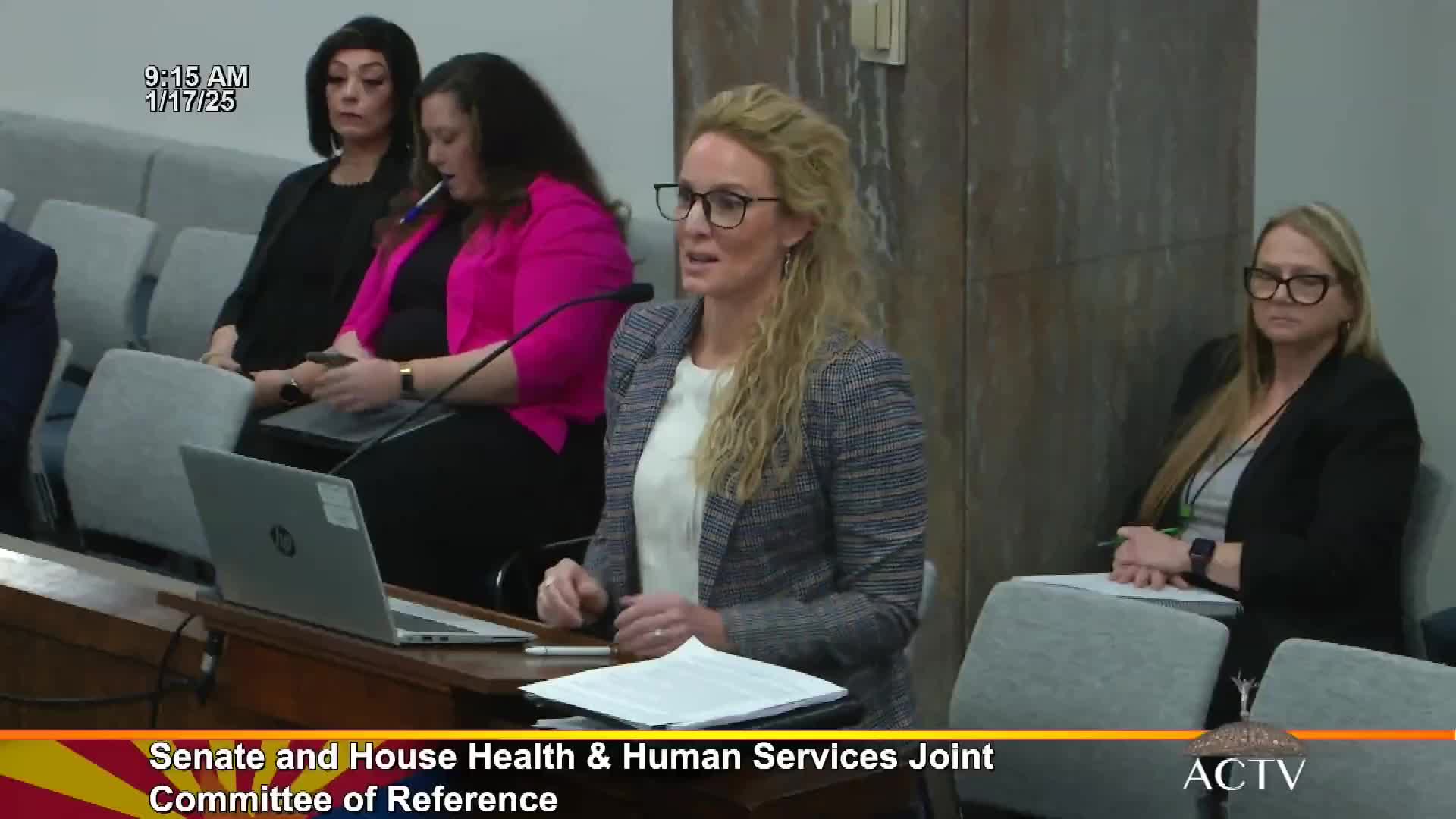Auditor General finds broad procedural failures at Arizona Board of Chiropractic Examiners; board agrees to most recommendations
Get AI-powered insights, summaries, and transcripts
Subscribe
Summary
The Arizona Auditor General presented a special audit to the Joint House and Senate Health and Human Services Committee on Jan. 24 that found the Arizona State Board of Chiropractic Examiners repeatedly issued overbroad subpoenas, failed to consistently report criminal allegations to law enforcement and carried a substantial complaint backlog; the board told lawmakers it has accepted most recommendations and is moving to implement changes.
The Arizona Auditor General presented findings from a special audit to the Joint House and Senate Health and Human Services Committee on Jan. 24, 2025, saying the Arizona State Board of Chiropractic Examiners frequently requested records and subpoenas beyond the scope of complaints, handled criminal allegations inconsistently and sustained a years-long complaint backlog.
The audit, done for the Auditor General’s office by consulting firm Sjoberg Evishenk, reviewed a sample of 70 complaints from 2021 through March 2024 and found multiple systemic problems, the most consequential of which the audit linked to slower investigations and potential patient-safety risks.
Auditor George Skiles said the board “regularly requested information beyond the scope of the complaint allegations, which is contrary to its statutory authority,” citing frequent demands for continuing education and full patient records even when they were unrelated to the complaint. Skiles warned that such overbroad requests can lengthen investigations, expose licensees to unwarranted allegations and increase risk to patient privacy.
The audit also found inconsistent use of psychosexual evaluations and a failure to report allegations of criminal wrongdoing to law enforcement. "Of the 10 complaints we reviewed involving criminal allegations that had not otherwise been reported to a criminal justice agency, the board reported only 1 of the 10 allegations to a law enforcement agency," Skiles said.
Alyssa Vanderveen, the board’s executive director, told the committee the board has accepted all but one of the audit’s 28 recommendations and is already implementing many changes. “The board has accepted all but 1 of the recommendations from the auditor general and has already begun to implement these recommendations,” Vanderveen said. She described efforts to narrow subpoena requests, to change renewal processes so continuing‑education records are collected at renewal, and to add investigative staff.
Vanderveen also said the board has increased enforcement and staff training and has already modified its procedures for redacting public recordings to protect privacy. She told legislators the board had been through high turnover and multiple executive directors and that the current leadership has prioritized clearing a complaint backlog and improving internal controls. Vanderveen emphasized cooperation with the State Attorney General’s Office for open‑meeting and other legal questions and said the board would comply with the Auditor General’s follow‑up review.
Committee members pressed both the Auditor General’s office and the board on several points. Representative Beverly Pingarelli and other members asked about the board’s practice of editing posted meeting recordings; Jeff Govan of the Auditor General’s office said the audit recommended the board work with the Attorney General’s Open Meeting Law enforcement task force. Representative Sarah Liguori and others pressed the board and auditors on the 180‑day benchmark for complaint resolution and whether investigators or licensees sometimes delay cases. The Auditor General’s office said 180 days is a widely used best practice; the board said complex cases and judicial stays can extend timelines, and noted steps it has taken to hire additional investigators and to prioritize higher‑severity complaints.
The Auditor General recommended 28 changes, including: stop subpoenaing information unrelated to the allegations; update policies to ensure subpoenas and information requests are narrowly tailored; establish specific policies for psychosexual evaluations; report criminal allegations promptly to law enforcement; reduce complaint time‑to‑resolution to within 180 days with a focus on higher‑severity cases; cease using public resources to encourage licensees to oppose or support legislation; comply with open meeting law requirements including posting unaltered recordings; and revise conflict‑of‑interest procedures.
The board agreed with most recommendations and told the committee it will implement 27 of 28 recommendations as written; Vanderveen said the board will adopt a different approach than a blanket 48‑hour requirement for reporting criminal allegations, preferring case‑by‑case referrals to law enforcement in consultation with the Attorney General’s Office. The audit team said they would follow up and report the board’s progress to the committee later in 2025.
The Auditor General told the committee the special audit had been contracted out because the office lacked capacity to complete the engagement in its regular schedule; staff estimated that contract work cost roughly $195,000. The board acknowledged past problems and outlined immediate procedural fixes and longer‑term changes, including improved renewal procedures so continuing education documentation will be collected at renewal rather than during investigations.
The audit presentation and board responses were followed by public comment from attorney Tom Marlow, who represented a chiropractic practitioner and argued some investigations had been needlessly prolonged; Marlow urged the committee to press the board on timely case closure and transparency. The committee did not take a formal legislative action at the hearing on the audit itself but directed the Auditor General to return with a follow‑up assessment later in the year.
The audit and board testimony provide a detailed roadmap of recommended reforms and a timeline for follow up. The Auditor General said it will report again to the committee on the board’s implementation later in 2025; the board says it has begun or completed several of the recommended changes and is working with the Attorney General’s Office on legal questions about reporting and open‑meeting compliance.
